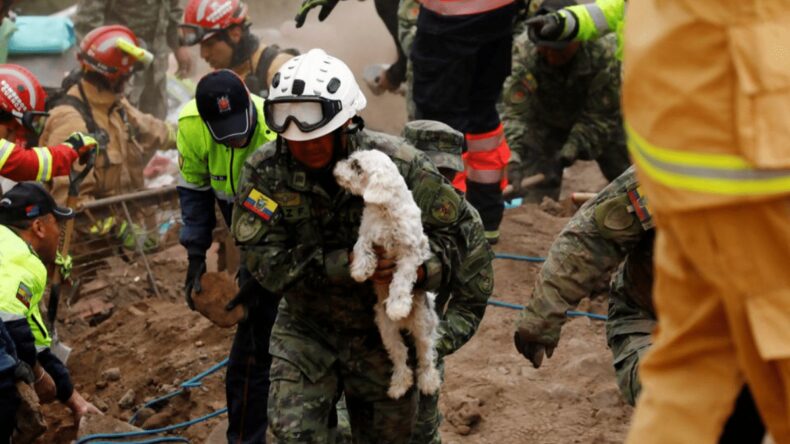A massive landslide in Alausi, Ecuador on March 27, 2024, due to heavy rain buried dozens of homes, killed seven people, left nearly 50 missing, and highlighted the devastating impact of climate change on vulnerable communities.
A Massive Landslide in Ecuador

On March 27, 2024, a massive landslide occurred in Alausi, a small village in southern Ecuador. The landslide buried dozens of homes and injured 23 people. According to the latest reports, at least seven people have died, and almost 50 others are missing. The landslide was triggered by months of heavy rain, which has caused several landslides and flooding in the country.
Rescue Operations in Alausi

Rescue operations are currently underway in Alausi, with emergency responders and civilians working to clear debris by hand to try to find any survivors. To aid the rescue operations, the government has deployed the national police, armed forces, health ministry, and the Red Cross. Temporary accommodation and sleeping kits have been provided to those who have lost their homes.
Yellow Alert Risk Zone
The region impacted by the catastrophic event on Sunday had been categorized as a yellow alert risk zone since February due to previous landslides. Despite this, many residents have chosen to remain in the area, putting themselves at risk. President Guillermo Lasso has called on all residents to vacate the areas affected by the disaster.
Previous Natural Disasters in Ecuador

This is not the first natural disaster to strike Ecuador this year. On March 16, a powerful earthquake with a magnitude of 6.5 struck Ecuador’s southwestern border region with Peru, killing 15 people and causing 22 landslides that blocked roads in the provinces of El Oro and Azuay. A state of emergency was declared by the government in 14 out of Ecuador’s 24 provinces for two months. This enabled economic resources to be reallocated to areas affected by the disaster.
Impact on Ecuador’s Oil Industry

The severe weather conditions have also impacted Ecuador’s oil industry. In February, the country had to halt oil pumping operations for five days due to heavy rainfall, as there were concerns that a significant oil pipeline could have been affected by the bridge collapse, prompting safety inspections.
The harmful consequences of climate change on at-risk communities
The situation in Ecuador highlights the devastating impact that climate change is having on vulnerable communities around the world. The frequency and intensity of extreme weather events such as floods, droughts, and landslides are increasing, putting millions of people at risk.
The Urgent Need for Climate Action

While Ecuador is a small country, it is not alone in facing the devastating consequences of climate change. The global community must come together to address this crisis and take action to mitigate its impact. This includes reducing greenhouse gas emissions, transitioning to renewable energy, and investing in adaptation measures to help vulnerable communities prepare for and respond to extreme weather events.
Tackling the Root Causes of Vulnerability and Inequality
In addition to climate action, it is also critical to address the underlying drivers of vulnerability and inequality that exacerbate the impact of natural disasters. This includes ensuring that communities have access to basic services such as water, sanitation, and healthcare, as well as education and economic opportunities.
International Support for Building Resilience

The international community can also play a role in supporting countries like Ecuador in their efforts to build resilience and address the impacts of climate change. This includes providing financial and technical assistance for adaptation measures, as well as supporting efforts to reduce emissions and transition to renewable energy.
The situation in Ecuador serves as a stark reminder of the urgent need for action on climate change. The consequences of inaction are too severe and too devastating to ignore. We must act now to protect our planet and our communities from the devastating impacts of climate change.













